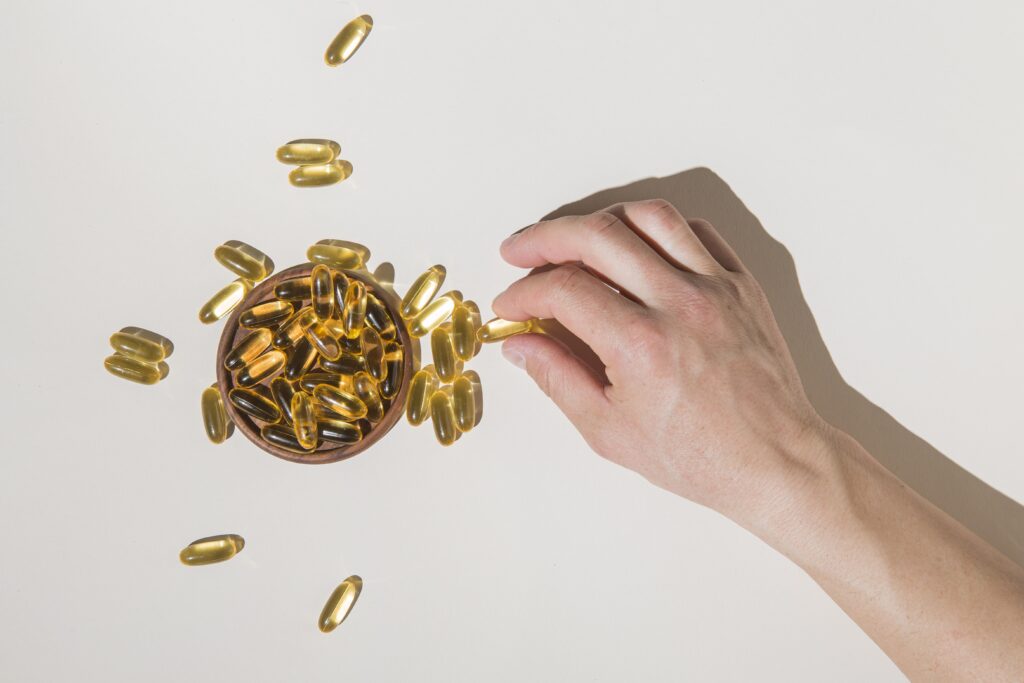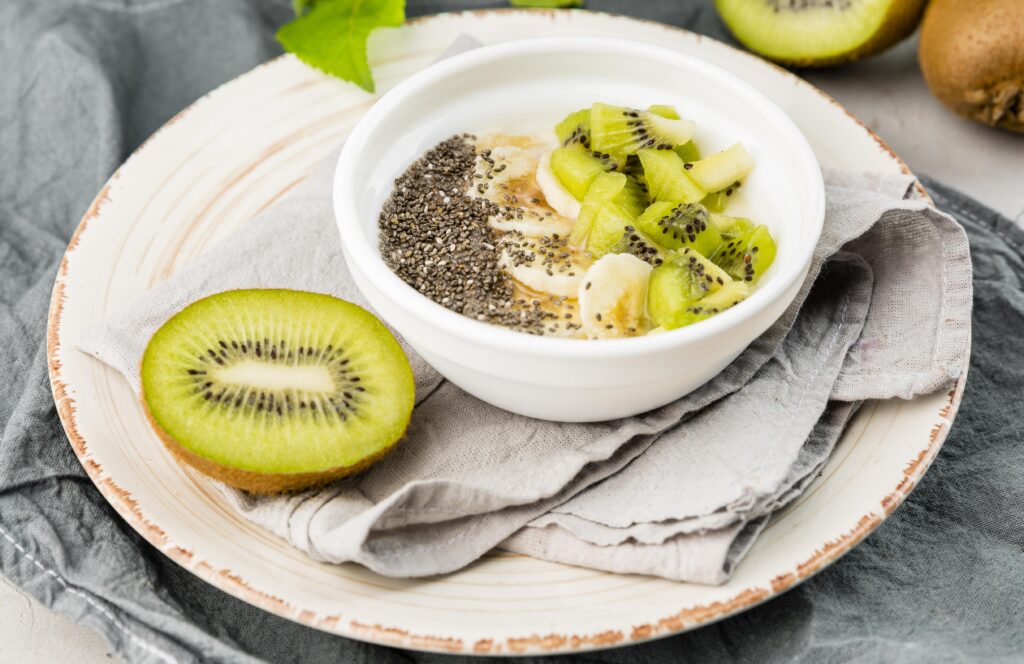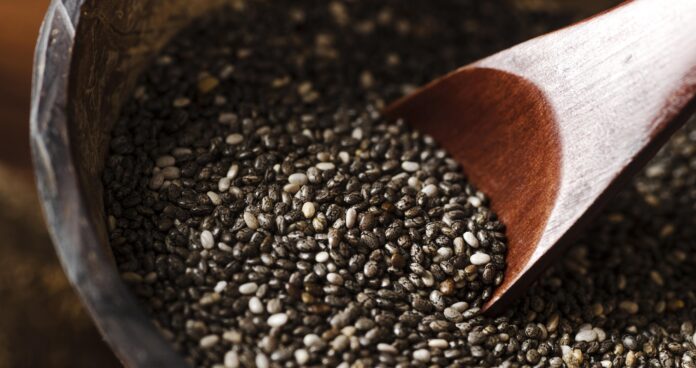Chia seeds are edible seeds packed with a nutritional punch including, protein, antioxidants, fiber, and omega-3 fatty acids. These are the seeds of a flowering plant known as Salba Chia, scientifically named Salvia hispanica. Chia seeds were grown first in Guatemala and Mexico. However, this crop has an ancient history as well because the studies prove its presence in Mesoamerican and Aztec cultures. Chia seeds were known for their nutritional and medicinal uses. People in ancient times used to add chia seeds to their diet due to their nutritional health benefits. Nowadays, chia seeds are categorized as a nutrient-dense addition to healthy diets and are commercially grown in many countries worldwide.
You can easily incorporate this nutrient treasure into your diet to give your diet an energy boost. Chia seeds are commonly used as a topping on oatmeal, smoothies, or cereals. Many people add them to prepared dishes to make them healthy and nutritious.
What are Chia Seeds?
Black or white colored chia seeds belong to a mint family plant known as a popular flowering plant. Chia seeds were known to human civilizations for over 6,000 years. Those people used these seeds in their diets as staple food.
Nutritional Analysis of Chia Seeds
Many essential nutrients are found in chia seeds, including:
- Phosphorus.
- Manganese.
- Iron.
- Calcium.
- Magnesium.
- Selenium.
- Copper.
The question is to maintain a balanced chia seeds serving for your daily diet plan. You should add 1 ounce of chia seeds per serving because it contains:
- Sugar: 0 grams
- Carbohydrates: 10 grams.
- Calories: 140 grams.
- Fats: 9.5 grams.
- Protein: 7.4 grams.
- Fiber: 8.9 grams.
Chia seeds are nutritionally heavy weights and contain various nutrients such as minerals, vitamins, fiber, and antioxidants that are surety to your improved health. In addition, some more nutrients are found in chia seeds, including:
Omega-3 Fatty Acids Biochemical analysis of chia seeds shows that chia seeds are an incredible source of ALA (Alpha-Linoleic Acid). This is a fatty acid that helps promote the concentration of omega-6 to omega-3 fatty acids in your body naturally. Lower concentrations of the said fatty acids increase the risk of inflammatory conditions, heart diseases, and cancer, all are chronic diseases. These seeds are rich in omega fatty acids. Typically, seeds, nuts, and fatty fish are great reservoirs of this fatty acid.
Biochemical analysis of chia seeds shows that chia seeds are an incredible source of ALA (Alpha-Linoleic Acid). This is a fatty acid that helps promote the concentration of omega-6 to omega-3 fatty acids in your body naturally. Lower concentrations of the said fatty acids increase the risk of inflammatory conditions, heart diseases, and cancer, all are chronic diseases. These seeds are rich in omega fatty acids. Typically, seeds, nuts, and fatty fish are great reservoirs of this fatty acid.
Your body cannot prepare ALA on its own. You have to get its required concentration from your food. Its consumption leads to heart health and decreased risks of chronic diseases.
Omega-3 fatty acids are important dietary nutrients essential for proper brain functioning, reducing inflammation in your body, and heart health. This type of fatty acid is beneficial for your cognitive and cardiovascular functions.
Protein
All nine essential amino acids of protein help stabilize your blood sugar level with a decreased risk of diabetes and work as an energy currency for your body’s functions. Chia seeds are rich in protein and thus recognized as a valuable source of protein that can be availed in the form of chia seeds.
Fibers
Chia seeds are a great source to incorporate fiber into your diet. Only two to three tablespoons of chia seeds can provide you with around 8.9 grams of dietary fiber. Studies prove that fiber intake is essential for decreasing the risks of:
- Digestive disorders.
- Type 2 diabetes.
- Inflammatory diseases.
- Different types of cancer.
- Cardiovascular disorders.
Chia seeds are the best source of lowering LDL (bad cholesterol) levels and triglyceride levels because they increase HDL (heart-protective cholesterol) levels.
Chia seeds contain a higher concentration of fibers that aid healthy digestion by allowing the stool to pass quickly from the intestines to limit the risks of constipation. Fibers help soften the stools.
Antioxidants
Antioxidants are found in large amounts in chia seeds. Several types of antioxidants such as polyphenolic compounds, carotenoids, tocopherols, and phytosterols are richly found in chia seeds and play a crucial role in lowering the concentration of free radicals in the body, which are hazardous for your body and health. Higher concentrations of free radicals lead to several diseases and cell damage. In addition, chia seeds have exceptional quality to help you against:
- Alzheimer’s disease.
- Diabetes.
- Inflammation.
- Cancer.
- Heart diseases.
Health Benefits of Chia Seeds
Numerous health benefits are associated with chia seeds as they contain nutrients needed by your body. Common heath benefits of chia seeds are:
- Manage appetite.
- Support to the digestive system.
- Reduction in blood pressure.
- Aid in weight management.
- Decrease in cholesterol levels.
- Reduction in inflammation.
- Protection against chronic diseases.
- Improvement in depression or anxiety.
- Control the diabetes.
Let’s have a deep look at these health benefits:
Decrease in Appetite During the digestion procedure, chia seeds are converted to a gel-like spongy substance that fills your stomach and induces a feeling of fullness. The result is a decrease in your calorie intake and reduced appetite.
During the digestion procedure, chia seeds are converted to a gel-like spongy substance that fills your stomach and induces a feeling of fullness. The result is a decrease in your calorie intake and reduced appetite.
Combating Free Radicals
Free radicals found in your body are dangerous for your mental and physical health as they cause cell damage and oxidative stress. Antioxidant-rich foods can help lower the concentration of free radicals in your body. Therefore, the intake of chia seeds is suggested by healthcare providers. Antioxidants found in chia seeds play a vital role in reducing the risks of several health issues linked with free radicals, such as certain types of cancer, heart diseases, and a decline in mental skills. These antioxidants also contain Quercetin, Chlorogenic acid, Caffeic acid, and Kaempferol.
Manage Blood Sugar Level
Studies show that chia seeds are rich in fiber that help reduce insulin resistance. Fibers are also responsible for improvement in blood sugar levels, and reducing the risks of diabetes type 2 and metabolic syndrome. Research shows that chia seed bread triggers a lower blood sugar concentration in your body than common bread.
Improvements Heart Health
Chia seeds are a great reservoir of quercetin compound that is an antioxidant and helps reduce the risk of several chronic diseases, such as increased blood cholesterol and heart diseases. Higher fiber concentration in chia seeds makes these a perfect choice for lowering high blood pressure as a result the risk factors for heart disease are also increased.
Help in Weight Management
Fiber-rich content in chia seeds is the best choice for losing and managing a healthy weight. Fibers present in chia seeds tend to absorb more water that causing them to expand in your stomach and you feel full after eating in lower quantities of chia seeds. Thus, chia seeds help you lose weight by decreasing your appetite and help you maintain a healthy weight by letting you feel fuller for longer. Incorporating chia seeds in your daily diet plan is suggested for managing your weight at a balanced level.
Maintain Hydration in the Body
Chia seeds tend to absorb more water, therefore eating chia seed-containing foods compels you to drink more water to avoid digestive problems you may feel in your digestive tract. Chia seeds water is a great way to add chia seeds into your diet. Chia seeds with water intake help you stay hydrated and maintain a balanced hydration level in your body.
Improvement in Skin Health
According to a 2023 study, chia seeds contain higher concentrations of vitamin F which is a necessary nutrient for glowing, flawless, and healthy skin. This vitamin is also specialized for improving hydration and skin health as well. Chia Seeds also tend to protect your skin against certain enzymes causing aging. However, more research is required to prove the benefits of chia seeds for skin health management.
Reduction in Inflammation
Several health conditions including heart diseases and cancer are caused due to chronic inflammation. Chia seeds contain antioxidants that help you fight against inflammation in the body. You can reduce several inflammatory markers in your body by adding chia seeds to your diet.
Improvement in Bone Health
Certain minerals like phosphorus or magnesium, are considered best for bone health. Studies show chia seeds are rich in minerals that help in bone health and bone growth. Chia seeds also have calcium which is an essential nutrient for muscle strength and better nerve function. According to research results, chia seeds contain more calcium than any dairy product you use for getting calcium.
Things to Look Out For
Excess of everything can sometimes lead to several complications. Similarly, eating chia seeds in excessive amounts can cause different health issues, including:
Digestive Issues: Eating too many chia seeds can lead to gas, bloating, diarrhea, and constipation because they are rich in fiber.
Allergies: Some people have allergic reactions to chia seeds. Although this happens rarely, severe symptoms such as itching of the tongue, vomiting, and diarrhea lead to serious conditions. Chia seeds cause a serious allergic reaction called anaphylaxis which can cause fatal symptoms if left untreated.
Interaction with Medications: Chia seeds can interact with the medications you are already taking for the treatment of high levels of blood pressure or blood sugar. Therefore, if you are a patient with hypertension or diabetes and taking medications for their treatment, you should be careful about chia seed use. Ask your healthcare provider before using chia seeds as a regular diet so that you may be protected from other health complications.
How to Incorporate Chia Seeds into Your Diet?
Incorporating chia seeds into your regular meals is very simple. You can add chia seeds simply into your soups, shakes or smoothies or mix them into your breakfast food like pancakes, yogurt, salads, or cereals. These seeds do not have a strong flavor therefore they cannot change the flavor of your food.
You can also use chia seeds by making a simple chia pudding that is a mixture of chia seeds, and liquids that give it a gelatinous coating and make a pudding-like consistency.
Always store chia seeds in a dark, cool, and dry place. In ground form place them in an airtight jar or bag and store them in a pantry. You can use chia seeds in several ways. Some easy chia seed recipes are jotted below:
You can use chia seeds in several ways. Some easy chia seed recipes are jotted below:
- Make chia pudding by mixing it with fruit juice or milk with a topping of fresh fruits.
- Use chia seeds in baked foods such as muffins, bread, and cakes.
- Mix them in your breakfast batter or pancakes.
- Mix them into your soups and smoothies to prepare a chia diet.
- Sprinkle chia seeds on your cereal oatmeal or salads.
- Make chia sprouts by soaking these seeds in water or milk.
- Mix them in spices and corn flour to make a delicious coating of fried chicken.
- Add them to your homemade energy drinks.
The outside layers of chia seeds are thin and can be broken easily. Therefore you can chew them easily. But in dry sprinkled form over a dish, you should use them in ground form. Their grinding is easy and can be done at home however they are also available in ground form.
Chia seed water is another way to enjoy the health benefits of chia seeds. Its excessive use can make you dehydrated because it absorbs water from your gut and tissues of the digestive tract. Therefore, healthcare providers and dietitians suggest drinking chia seed water along with a meal.
Conclusion
Chia seeds improve your overall health in many ways. These seeds help protect you from several health conditions including, high blood sugar levels, free radicals, hypertension, heart diseases, or other chronic inflammatory conditions. Health Benefits of Chia Seeds compel you to use chia seeds in different recipes to incorporate them into your regular diet plan. Always talk to your doctor before adding chia seeds to your daily diet plan because chia seeds can interact with certain medications you are taking for the treatment of certain medical conditions.







